
Was this newsletter forwarded to you? Subscribe here to keep up to date on NFCA News!
In this edition:
Co-op Impact
Brandon Parham is an intern with the Neighboring Food Co-op Association (NFCA), working on completion of the Certificate in Applied Research in Co-operative Enterprise at UMass Amherst.
 My time as an intern at NFCA has been spent assessing and communicating the collective impact that NFCA Member Co-ops have had on their communities and the region. This was accomplished through the analysis and reflective interpretation of data collected from NFCA’s Fiscal Year 2021 Annual Impact Survey. Reporting focused on activities and policies being implemented, and explored the outcomes and the meaningful change associated with them, thereby establishing where potential further action may be needed. The results highlight the shared values of the association and its member co-ops, and helps people to better understand the impact of the co–operatives and the initiatives being taken to overcome challenges. Through this analysis, I learned the importance of community engagement when it comes to building sustainable social and economic environments.
My time as an intern at NFCA has been spent assessing and communicating the collective impact that NFCA Member Co-ops have had on their communities and the region. This was accomplished through the analysis and reflective interpretation of data collected from NFCA’s Fiscal Year 2021 Annual Impact Survey. Reporting focused on activities and policies being implemented, and explored the outcomes and the meaningful change associated with them, thereby establishing where potential further action may be needed. The results highlight the shared values of the association and its member co-ops, and helps people to better understand the impact of the co–operatives and the initiatives being taken to overcome challenges. Through this analysis, I learned the importance of community engagement when it comes to building sustainable social and economic environments.
Better understanding the co-op business model is an idea I further explored through my own research. I took notice of the considerable growth NFCA saw among member co-ops despite the challenges of the COVID-19 pandemic and wanted to learn more about why that is. In 2021, NFCA’s Annual Impact Survey reported that annual revenue of member co-ops grew 3% over the previous year (2020), to over $395 million. Across these 42 food co-ops, 14,365 people joined as new members while in 2020, there were 11,980 new members totaling 26,345 new co-op members in the span of the pandemic. What I found was that food co-operatives played a key role in sustaining local economies. For example, sales of local products comprised 25% of NFCA member co-ops collective annual revenue in 2021. Through collaboration and local sourcing, co-operatives maintained a competitive advantage in the retail food industry. This is because of the core values that food co-ops adhere to even in the face of adversity. Solidarity was determined to be a key factor in NFCA’s co-ops for their success. 88% of NFCA’s member co-ops believed that the success of their individual co-operative is supported by the shared success of other co-ops in the association. With this in mind, I started to think about the distinguishing factors between conventional and co-operative grocers.
The Co-operative Values and Principles have a positive impact on the communities they engage with, maximizing the well-being of both individuals and their communities as a whole, which is a concept that other grocers lack. Community development and engagement are key areas that provide local economies the ability to flourish, and that is what occurred when food co-ops worked together through the NFCA during the pandemic. In 2021, 4,952 participants in Healthy Food Access programs, such as Food For All, received more than $1 million in needs-based assistance. Total participation grew by 579 members with an increase of almost $170,000 in discounts over 2020. In 2021, NFCA’s member food co-ops also distributed more than $2.2 million in discounts to their employees, an increase of over $236,000 compared to the previous year 2020.
The NFCA helped co-operatives come together and share information and resources on topics such as healthy food access in 2021, providing real benefits to their members, employees and communities and distinguishing co-ops from regular grocers. When it comes to community engagement and development, working together is more effective than acting alone, as communicated in the 6th Principle of the Co-operative Identity, “Co-operation among Co-ops.” This sets the model apart as a tool for combatting community challenges and shows the effectiveness of co-operation. Given this, I then explored some of the factors for why some people choose shopping at regular grocers versus a food co-op.
Unfortunately, I found this related to a lack of understanding of the full meaning and benefits of co–operatives. There is a large audience of people who may have an interest in food co–ops, but they just don’t know what they are, how they could participate in them, or how they might benefit. Co–operatives also offer valuable tools for expanding inclusion and equity. However, the educational reach is largely limited to the communities where they exist. Speaking for myself, I have lived in places where food co-operatives have been prominent, yet I never considered joining one due to unfamiliarity. My first introduction to what a co–op is was through a course at UMass Amherst called the Economics of Co–operative Enterprises, offered through the Department of Economics. This led me to seek a Certificate in Applied Research in Co-operative Enterprise offered by the department, and my internship with the NFCA. With what I have learned I now understand the vitality of co–operatives and hope to further spread the benefits for their continued social and economic growth in the world.
Brandon Parham is a senior majoring in economics at UMASS Amherst and interned with NFCA as part of his requirements for the Certificate in Applied Research in Co-operative Enterprise at the Department of Economics. Brandon plans to take a gap year before pursuing an MBA program in preparation for a career that will allow him to research and analyze business models while providing consultation for sustainability and improvement.
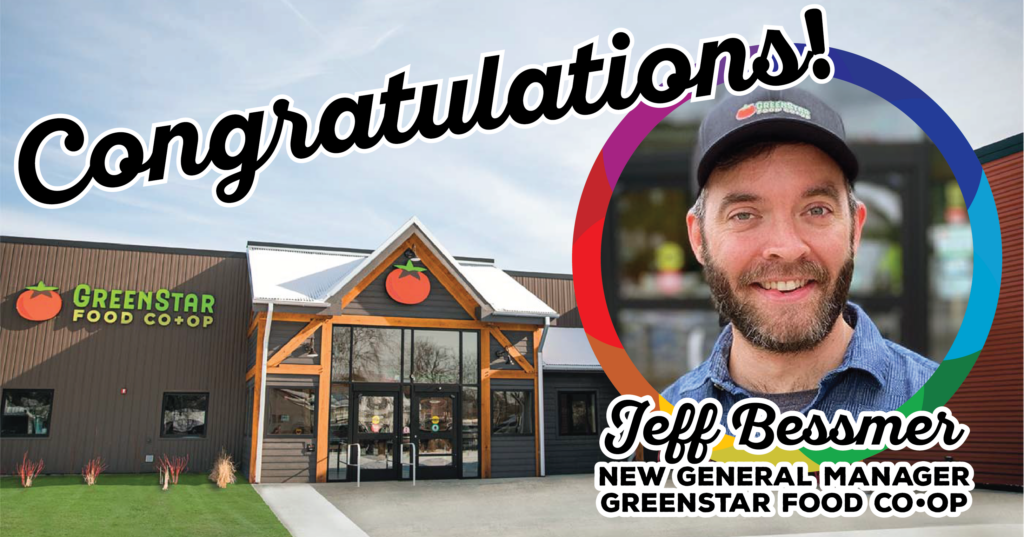
New GM at GreenStar Food Co-op
The Council of GreenStar Food Co-op is pleased to announce the hiring of the Co-op’s next General Manager, Jeff Bessmer. Bessmer will begin in his new role on July 5th.
A cooperative management professional of 15 years, Bessmer has served as General Manager for three co-ops, bringing their communities together to realize a more cooperative future. Bessmer is committed to member engagement and community involvement, has served on eight local and national co-op Boards and holds a Masters of Management of Cooperatives and Credit Unions degree from Saint Mary’s University. Bessmer is relocating from Sacramento, CA and says he is excited to serve the Ithaca community and beyond.
The recent hiring is the culmination of a six-month search that began in January with the formation of an ad-hoc General Manager Search Committee, composed of six GreenStar Council members and three Co-op staff members.
GreenStar’s Council recognizes and appreciates that GreenStar employees Deb Peskin, Director of Human Resources and Giles McCarty, Front End Manager ably served as Interim General Manager and Assistant Interim General Manager, in addition to their regular jobs, during the search process.
“We are grateful to Deb and Giles and all of our dedicated GreenStar staff for keeping co-op operations on track during this challenging period,” Council President, Marilyn Chase said.
Find out more about GreenStar Food Co-op by clicking here!
Recognizing Outstanding Co-op Leaders
In June, Food co-ops from the Northeast received national recognition at the CCMA Food Co-op conference in Sioux Falls, South Dakota.
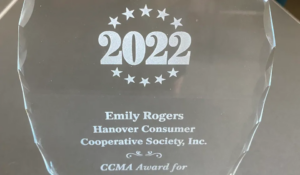 A number of co-op leaders from Neighboring Food Co-op Association (NFCA) member co-ops received national recognition for their leadership and achievements at the national CCMA conference for food co-ops, June 9-11th in in Sioux Falls, South Dakota.
A number of co-op leaders from Neighboring Food Co-op Association (NFCA) member co-ops received national recognition for their leadership and achievements at the national CCMA conference for food co-ops, June 9-11th in in Sioux Falls, South Dakota.
Congratulations to Emily Rogers of Hanover Co-op Food Stores, an NFCA founding member, for receiving the 2022 Co–operative Innovation and Achievement Award, which recognizes leaders who “understand the urgency, relevancy, and complexity of the problem or opportunity addressed by the innovation, which results in measurable improvements or achievements that resonate with the co-operative principles and the co-operative’s mission.”
Emily began her co-operative career as a cashier at the co-op’s Lebanon store more than 20 years ago. She’s now the Education Manager leading major initiatives for the entire organization. She spearheaded the successful launch and implementation of the “Pennies for Change” round-up program, which has contributed more than $1 million dollars directly to the local community through Upper Valley non–profits. Her work on food access, sustainability initiatives, member engagement strategy, and other educational programs illustrate her commitment to others and the embodiment of the Co-operative Principles and Values.
Dorian Gregory, who served on the board of NFCA member River Valley Co-op from 2011 to January 2022 in the capacity of Board Treasurer, Vice-President, and ultimately, President, received the well-deserved Co-operative Board Service Award. This award recognizes a board member who has gone above and beyond the scope of expected board work, who fosters democratic organization and champions the Co–operative Principles, and exhibits the highest standards of excellence, dedication, and accomplishment, and in doing so has pushed the co-op to meet its goals to the benefit of both the co-op and the community.
With a diversity of experiences and skills and an enthusiasm for co-ops, Dorian built teamwork and collaboration within the Board and partnered successfully with GM, Rochelle Prunty, helping to create and perpetuate an effective and productive board culture. As the Co-op grew to over $30 million by 2020, Dorian played a significant role in leading the Board and engaging co-op ownership to participate in and support a strategic plan and Co-op Owner Loan Fund drives to expand their original store and successfully open a second store during the COVID pandemic, to increase positive community impact. She also led the Board through an intensive process working with a DEI consultant, bringing the Board together as a team to expand their knowledge base and thinking about how the cooperative could address diversity, equity, and inclusion in 2020-2021, resulting in a review and revision of Board policies.
John Santos, General Manager of NFCA Member Urban Greens Co-op in Providence, Rhode Island, proudly accepted the Food Co-op Initiative Startup of the Year Award. This award recognizes the heroic efforts made by new co‐ops to open stores in their communities, displaying notable excellence in community organizing, co-operative education and ownership growth, viable business planning, innovation, and implementation of new approaches to meet the needs of traditionally under-served communities. Urban Greens has been a member of the NFCA since its organizing days and is our most recent food co-op start-up to open its doors.
Urban Greens stands-out as a start-up co-op, recently celebrating their second year of operation, because of their robust and successful efforts to be a truly inclusive community organization. From their Guiding Values which highlight their belief and commitment to equitable access of healthy, affordable, culturally inclusive, and environmentally sustainable local food and products for their community, with particular attention to those who are underserved, to their programming, sourcing, product availability and general co-op practices, Urban Greens has stayed true to their commitment, while running a successful community-owned co-operative. A prime example of their commitment is opening the store with a Food for All, needs-based discount program and an affordable membership option in place. Three Cheers!! to John and all the Urban Greens’ staff, board directors, and members for bringing your vision of equity and access to reality.
The NFCA extends our congratulations to all of this year’s awardees and offers our appreciation for their contributions to the shared success, innovation, and growth our community of food co-ops!

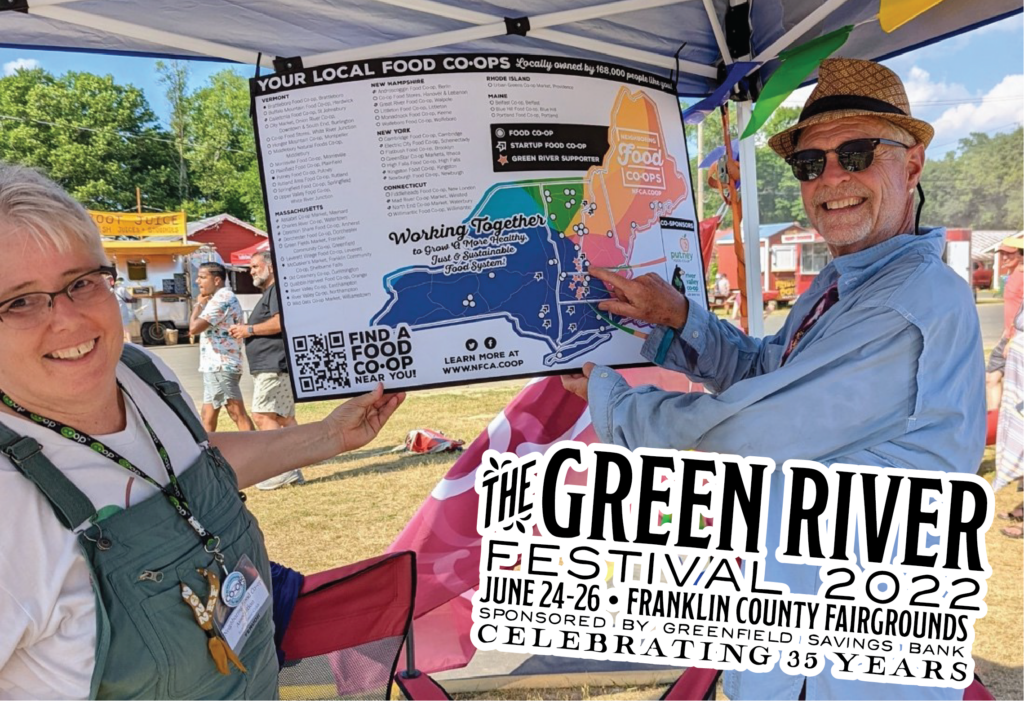 The Neighboring Food Co-op Association was a sponsor of the Green River Festival’s 35th year, spreading the word about the good work of our Member Food Co-ops.
The Neighboring Food Co-op Association was a sponsor of the Green River Festival’s 35th year, spreading the word about the good work of our Member Food Co-ops.
Four stages with over 40 bands, a Maker’s Market, local food, beer, cider and wine, kids activities — that’s the Green River Festival, a music event now in it’s 35th year held at the Franklin County Fairgrounds, Greenfield, MA. The festival, which draws over 15,000 people from all over the Northeast, is a family friendly event and a great opportunity for us to spread the word about food co-ops and our collaboration with the Northeast Organic Family Farm Partnership.
We had young people stopping by to spin the co-op wheel, answer a question like “who owns a co-op?” or “can you name a co-op near you?” and win a co-op themed prize. We had conversations with folks of all ages and familiarity with food co-ops — for some this was an introduction to the co-op world, others were happy to find their food co-op on the map and tell us how much they loved being a member. Thanks to our collaboration with the Northeast Organic Family Farm Partnership, we gave out Sidehill Farm yogurt samples and offered information on how people could “take the pledge” to support our region’s organic family farmers. (See more photos on our facebook page.)
We were fortunate to have volunteers from nearby member co-ops, including Old Creamery Co-op, Brattleboro Food Co-op, and Franklin Community Co-op, staffing our tent throughout the weekend. Thanks to them and the financial support of all, including River Valley Co-op and Putney Food Co-op, we had a great weekend spreading the word about the co-op difference. Mark your calendar for June 23-25, 2023 as perhaps we’ll make this an annual event!
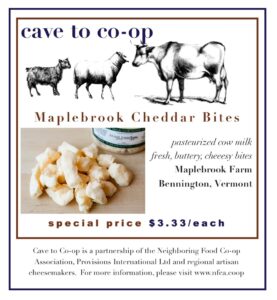
This month’s special cheese is Cheddar Bites, Maplebrook Farm, Bennington, VT
Maplebrook Cheddar Bites are cheddar cheese curds pulled from the vat before they would be pressed into blocks for aging. They melt wonderfully for poutine and deep fry even better; they’re also a wonderful and easy snacking cheese and a great addition to any cheese board.
In 2003, while visiting an Italian specialty store in Manchester, Vermont, Johann Englert had a flash-back to her college years. A cluster of fresh mozzarella balls sitting on the counter reminded her of a groceria she had visited while traveling in Italy. Johann bought 20 balls of mozzarella on the spot. After sampling those 20 balls to gourmet shops in Boston, Johann and Mike Scheps, third generation mozzarella maker, joined together to found Maplebrook Farm in Bennington, Vermont. Business boomed; the operation moved from a kitchen to a small store to a 10,000 sq. ft. building.
Maplebrook Farm developed an apprenticeship program to teach new employees the art of making perfect mozzarella. The program started with three aspiring cheesemakers and has grown to include 50 employees who are making small batches of cheese and wrapping them by hand every day of the week. Maplebrook went from those first 20 mozzarella balls to more than 40,000 pounds produced weekly. If you haven’t tried cheddar bites yet, this might be the month to! They are a squeaky, buttery cheese treats made with rBGH & rBST-free, 100% Vermont cow milk.
Each month, your Neighboring Food Co-ops feature our region’s artisan cheesemakers by offering a specially selected cheese at great price. The Cave to Co-op program is possible because of the partnership between distributor Provisions International, NFCA Co-ops and the many cheese producers in our region. Strengthening our local and regional farmers and producers by supporting artisanal cheesemakers is a key goal of the Cave to Co-op program.
Look for the “Cave to Co-op” sign in the cheese section at your local food co-op. To find one near you, visit www.nfca.coop/members.
Nationwide, a Fortune 100 company based in Columbus, Ohio, and one of the largest and strongest diversified insurance and financial services organizations in the United States, was founded on co-operative principles by farmers with the Ohio Farm Bureau in 1926.
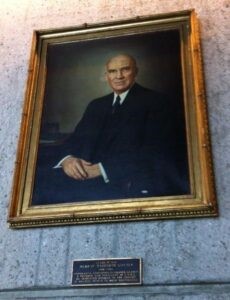
“People have within their own hands the tools and the power to fashion their own social and economic destinies,” said Lincoln in his book, Vice President in Charge of Revolution, “if they will only organize themselves to use them.”
Born on a family farm in Massachusetts and a graduate of the Massachusetts Agricultural College (now the University of Massachusetts, Amherst), Lincoln also served as President of the National Cooperative Business Association, CLUSA International, and on the board of the International Co-operative Alliance (ICA).
Lincoln’s legacy and tradition of Nationwide’s support of co-operatives continues to this day. Devin Fuhrman, vice president of sponsor relations at Nationwide, stressed the importance of these connections to the company’s past and future:
“Lincoln was truly a visionary leader in the co-operative business model internationally and Nationwide remains deeply supportive today of organizations like the Federation of Southern Cooperatives, that help ensure that all voices are represented in agriculture and co-operatives,” Fuhrman said. “Food and co-operatives are where our roots began and we’re proud to be a sponsor of the 10th Annual Meeting of the Neighboring Food Co-op Association.”
Nationwide has two large agricultural co-operatives as sponsors – CHS, Inc. and Southern States Cooperatives. Nationwide has also been a leader in workplace diversity, receiving a 100% rating from Corporate Equality Index every year since 2004, and is a long-time supporter of the Federation of Southern Cooperatives Land Assistance Fund.
“As we work to build a stronger more resilient economy, people are looking for alternatives that put more power in their hands. Working together, co-ops and mutuals have an opportunity to share a proven solution: the co-operative business model,” said Erbin Crowell, executive director of the Neighboring Food Co-op Association. “We’re so appreciative of Nationwide’s continued support and look forward to future collaboration.”
For more information on Nationwide, please visit www.nationwide.com.
Another Year of Local Food Safety on the Horizon
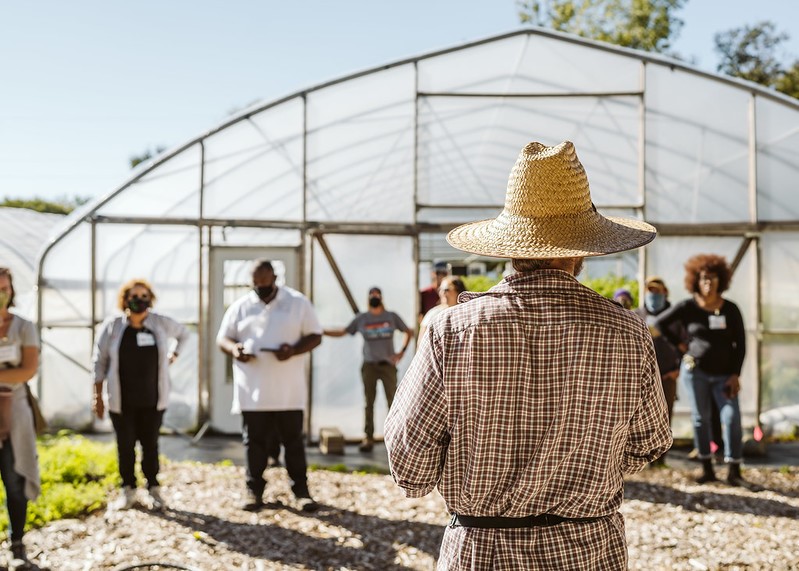
A global pandemic, fragile supply chains, and rising food prices may sound all doom and gloom, but they’ve also sparked a new wave of interest in local food, with small-scale growers and processors busier than ever growing and providing food for their communities. Food safety is a top priority, as integrating best practices is good for both business and consumers, making sure the food on their plates is tasty and safe. The Local Food Safety Collaborative (LFSC), a cooperative agreement with the Food and Drug Administration (FDA) and National Farmers Union, is excited to announce another year of food safety education and outreach to help support local food producers.
LFSC is proud to partner with organizations across the country including Auburn University, Carolina Farm Stewardship Association, Keep Growing Detroit, Kentucky Horticulture Council, Montana Farmers Union, New England Farmers Union, The Produce Safety Alliance, Tilth Alliance, and The United Christian Community Association (TUCCA) to provide food safety education, training, and technical assistance. These organizations use their regional expertise to address the needs of small-scale, diversified, sustainable, organic, and identity-preserved growers and processors. In turn, building food safety knowledge helps producers meet Food Safety Modernization Act (FSMA) requirements, thus strengthening their ability to engage with markets and ensuring a safer food supply.
This year’s work will be as diverse and robust as the communities our project partners aim to serve. From workshops and on-farm field days to one-on-one technical assistance and developing educational resources and practical tools, LFSC is dedicated to helping local food producers who have a unique place within FSMA regulations not only understand these rules, but also integrate best practices into their operations. The “collaborative” of Local Food Safety Collaborative is front and center, with producers acting as peer-to-peer educators sharing real-world experiences, making their voices and needs heard through listening sessions, and providing their input on resources that make sense for their operation type, scale, and culture. You’ll also find project partners working with university extensions, Departments of Agriculture, and other community-based organizations to make sure we’re not only reaching small-scale producers, but also connecting them to the best help for their needs and creating a culture of food safety from farm to fork, seed to spoon.
To learn more about LFSC, visit the Local Food Safety Collaborative website. For some excellent resources, check out the Food Safety Resource Clearinghouse for a curated source of food safety guides, factsheets, templates, and more. And don’t forget to follow LFSC on Facebook and Twitter for updates on events and the latest news!
By Kathryn Kavanagh
Our Local Farmers Need You!
 National Farmers Union advocates on behalf of nearly 200,000 American farm families and their communities. We envision a world in which farm families and their communities are respected, valued, and enjoy economic prosperity and social justice. Farmers are invited to join the New England Farmers Union chapter – and consumers can join as a “Friend of the Farmer” for just $15. For more information, please visit www.newenglandfarmersunion.org.
National Farmers Union advocates on behalf of nearly 200,000 American farm families and their communities. We envision a world in which farm families and their communities are respected, valued, and enjoy economic prosperity and social justice. Farmers are invited to join the New England Farmers Union chapter – and consumers can join as a “Friend of the Farmer” for just $15. For more information, please visit www.newenglandfarmersunion.org.

For more information, visit https://www.smu.ca/iccm/.



